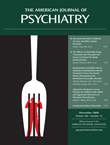Prior Treatment and Its Effect on Outcome
To the Editor: I would like to comment on two sources of potential bias (which may neutralize each other) influencing the results in the study by Falk Leichsenring, D.Sc., et al. (1) , published in the August 2009 issue of the Journal. The 45.6% of sample patients that “ had undergone psychotherapeutic treatment in the past” ( 1 , p. 877) suggests that these subjects probably had a favorable prior experience with this treatment modality, predisposing them to a good outcome. (The authors did not indicate the percent of the investigated group that received earlier cognitive-behavioral therapy [CBT], but I assume that it was lower.) On the other hand, the fact that CBT therapists were more familiar with the use of manuals than psychodynamic therapists may have constituted a disadvantage for the treatment efforts of the latter group.
Another possible bias, in the article’s conclusion, is that both treatments were “beneficial.” First, the research methods did not address this issue. Second, almost every treatment intervention for psychological symptoms, including homeopathic remedies, produces short-term success. In addition, a favorable consequence that may depend on a placebo effect is implied in the accompanying editorial by Barbara Milrod, M.D. (2) . However, this is not considered at all in the article.
1. Leichsenring F, Salzer S, Jaeger U, Kachele H, Kreische R, Leweke F, Ruger U, Winkelbach C, Leibing E: Short-term psychodynamic psychotherapy and cognitive-behavioral therapy in generalized anxiety disorder: a randomized, controlled trial. Am J Psychiatry 2009; 166:875–881Google Scholar
2. Milrod B: Psychodynamic psychotherapy outcome for generalized anxiety disorder. Am J Psychiatry 2009; 166:841–844Google Scholar



